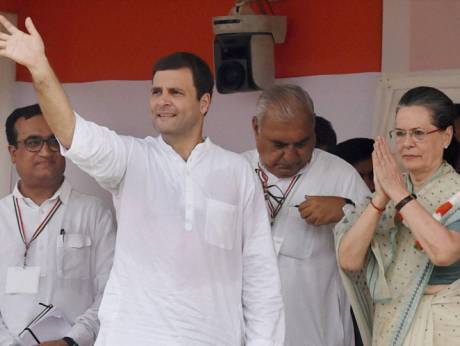- For all its imperfections, the Congress Party represents the Idea of India and the country’s colourful diversity. The continuing decline of the party is a tragedy for all Indians and their dream of an inclusive India
Gulf News
Aijaz Zaka Syed
 In face of the continuing missteps by Prime Minister Narendra Modi’s BJP and other upstarts across India, Sonia Gandhi’s Congress Party seems to have only one answer: Rahul Gandhi. But what do you do when the prodigal son fails to deliver, time and time again.
In face of the continuing missteps by Prime Minister Narendra Modi’s BJP and other upstarts across India, Sonia Gandhi’s Congress Party seems to have only one answer: Rahul Gandhi. But what do you do when the prodigal son fails to deliver, time and time again.
Congress and its Italian-born president have been waiting for ages for Rahul to take charge of the party and restore it to its lost glory. But the son simply won’t grow up. What was supposed to have been the party’s most potent weapon and asset has seemingly become its greatest liability.
From his frequent emotional outbursts when the Congress was in power under Manmohan Singh to his antics on the question of demonetisation, his actions seem to lack coherence and direction. In his efforts to assert his leadership and signal his arrival as the leader of India’s biggest political party, Rahul only comes across as desperately impetuous.
This week, a day after he accused Modi of ‘personal corruption’ and promised a political earthquake if he opened his mouth and just when the entire opposition was walking out of parliament over demonetisation, he went and met the Prime Minister, surprising everyone. No wonder the old guard in the party thinks he’s not ready to take over the reins.
Under younger Gandhi, the grand old party hasn’t won a single election. No one expected the Congress to do well in the assembly elections earlier this year in five crucial states — Kerala, Assam, West Bengal, Tamil Nadu and Puducherry. Yet the margin of the party’s defeat — except in the union territory of Puducherry — came as rude shock to many.
While the Left victory in Kerala had been a foregone conclusion, what was surprising was the decisive margin of its victory and unexpected debut of the BJP in the southern state known for its secular politics. Even more stunning was the spectacular BJP victory in Assam, nearly wiping out the Congress from a state it long monopolised.
All this has of course happened on the watch of Rahul Gandhi. Unbelievably, India’s oldest political party has been forced to the margins. Quite a feat for a party that had been in power at the centre until only two years ago. The Congress has to blame no one but itself for this state of affairs.
What began as a fancy slogan during the 2014 polls, Modi’s campaign of Congress Mukt Bharat (Congress-free India) no longer looks like a distant possibility. By failing to confront the BJP and its worldview and presenting the nation with an alternate, redeeming narrative, the Congress has only aided Modi in his mission.
Today, the footprint of India’s natural party of governance stands at an all-time low. The party now rules just six states and around 7 per cent of the country’s population.
Optimists like former minister Mani Shanker Aiyer still insist that the Congress is neither on the deathbed nor in the ICU.
Indeed, no matter what saffron fantasies would have you believe, a ‘Congress-free India’ is not just easier said than done, it would be a great tragedy.
For all its flaws and erosion of its base, the Congress remains the only party that has presence across the length and breadth of India, in every town and village, literally.
One wouldn’t shed tears for the Congress if it weren’t for the fact that it represents India in all its colourful complexity and diversity. Congress is a metaphor and microcosm for India. Notwithstanding its inherent contradictions, the party has inextricably been linked with the journey of the nation, mirroring its highs and lows. Having provided leadership during the long struggle against colonialism, it is still the only party that can credibly claim to represent all communities, regions and groups.
Isn’t it a tragic irony then that a national institution with such proud history is today being assailed by the BJP with its all too familiar past?
The meltdown of the Congress is mostly unfortunate and does not augur well for the future and well-being of Indian democracy, especially when it directly translates into the rise of a divisive ideology and worldview. For all its imperfections, the Congress still represents the idea of India. The continuing decline of the party is a tragedy for all secular and democratic forces in the country and their dream of an inclusive India. Dynasty loyalists like Digvijay Singh and latecomers like Shashi Tharoor both agree that the time for introspection is over and it’s time for the Congress to act to arrest its fall. Given its history and the party faithful’s tendency to deflect all criticism of the leadership though, there is little hope that the party is ready to reinvent itself. If the Congress has to survive and remain relevant in a fast-evolving country with an overwhelmingly young population, it must act swiftly and boldly — with or without the Gandhis. Cosmetic corrections will no longer work.
If the party wants the Gandhis to remain at the top, it is their choice. However, if they cannot be part of the solution, they have to make way for others, rather than block the way. They mustn’t become the proverbial millstone around the party’s neck. There’s no dearth of talent in the party. People like P Chidambaram, Salman Khurshid, Kapil Sibal and Shashi Tharoor boast both skills and experience to take on any responsibility.
In marketing parlance, the Congress has still got a great brand name — perhaps better than everyone else — and enjoys the broadest appeal, cutting across all sections of society. It only needs to focus on its core messaging and reconnect with its target audience. Instead of trying to be all things to all people, it needs to rediscover the universal ideals that once inspired it and which are at the heart of Indian Constitution — values like pluralism, secularism, tolerance, and participation of all in the democratic process. All said and done, no one can help the Congress until and unless it chooses to help itself.




